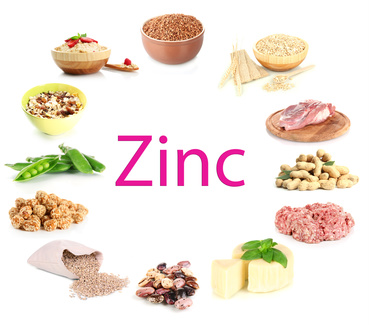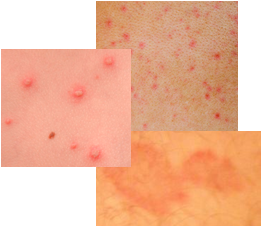- Home
- Food and Skin
- Zinc Deficiency
Zinc Deficiency
Visit this
PICTURES OF RASHES PAGE
Foods That Provide Zinc
In order to avoid a zinc deficiency and to take advantage of the benefits of zinc for the skin and overall good health, it is a good idea to know which foods are good sources of this mineral.
Zinc can actually be found in a wide variety of food sources. The number one source of zinc is oysters. Six medium oysters should satisfy the daily requirement for zinc intake for adults. However, there are other good sources of zinc as well:
Red Meat
One hundred grams of various cuts of beef can provide from 25 to 60 percent of the daily requirement for adults. For example, 100 grams of lean beef shank is high in zinc and provides 60 percent of the daily requirement, whereas a lean eye of round cut provides 25 percent.

Poultry
One chicken leg will provide about 20 percent of the daily requirement. On the other hand, half a chicken breast will provide 6 percent.
Pork
Pork is also a good zinc food sourc. Lean pork shoulder and lean pork tenderloin (100 grams) will provide 30 and 15 percent of the recommended daily requirement for adults respectively.
Fortified Breakfast Cereals
Depending on the amount of fortification, breakfast cereals can provide anywhere from 25 to 100 percent of the daily zinc requirement. Carefully read the ingredients and nutritional information of the cereal to determine how much zinc is present.
Dairy Products
The benefit of zinc can also be obtained from dairy products.
- 250 ml of yogurt = 15 percent of daily requirement
- 30 grams of Swiss cheese = 8 percent of the daily zinc requirement
- 30 grams of cheddar or mozzarella cheese = 6 percent towards the zinc requirement for the day
- 250 ml of milk = 6 percent of the daily requirement
Beans
Beans, lentils, chickpeas, or peas provide from 6 to 10 percent of the zinc requirement for the day if 125 ml or half a cup is consumed.
Other
Other sources of food that can be eaten to prevent low zinc levels include nuts, seeds such as pumpkin seeds, whole grains, whole wheat flour, rye flour, oat flour, certain types of seafood, eggs, and brewer’s yeast.
Zinc Deficiency
Despite the various sources of zinc available in foods, individuals are often zinc deficient and are not able to reap the benefit of zinc for their skin and body. There are several reasons for people suffering from a zinc deficiency. First, zinc absorption is higher when the source is from animal proteins as opposed to plant proteins. Therefore, many vegetarians often are zinc deficient. Vegetarians need to play close attention to what they eat in order to satisfy the zinc requirement in their diets.
Another reason for zinc deficiency is that much of the zinc available in diets is not absorbed. Up to 80 percent of the zinc ingested with food is not absorbed by the body. This is partly due to phytates, which are found in whole grain breads, cereals, legumes, and a variety of other products. Phytates combine with the zinc and inhibit zinc absorption. Alcohol can also reduce zinc absorption by the body. Therefore, individuals often do not receive the benefit of zinc that they believe they are getting.
In addition to poor zinc intake and absorption, a deficiency occurs because of the various ways that the body eliminates zinc. Zinc can be lost in urine, faeces and especially when chronic diarrhea is involved (Crohn’s disease, etc.), sweat, semen, and menstruation.
A person who is zinc deficient and not experiencing the benefit of zinc for skin and health will usually experience some common symptoms. These signs include growth retardation, hair loss, diarrhea, delayed sexual maturation, impotence, loss of appetite and weight loss, poor wound healing, and less sensitive taste and smell senses. Consult with a physician to determine whether these symptoms are due to a zinc deficiency or some other health problem.
Zinc Supplements
Zinc supplements can also be taken to obtain the benefit of zinc for skin care and the body. However, consult with a physician before taking supplements to ensure that too much zinc is not being ingested. Excess zinc in the body is toxic and there will be no benefit of zinc for the body and skin in this situation. Too much zinc will interfere with the metabolism of iron and copper, two minerals that the body requires. Signs of a zinc overdose include nausea, diarrhea, dizziness, drowsiness, and possibly hallucinations.
More Zinc Related Information:
benefit of zinc | zinc deficiency
